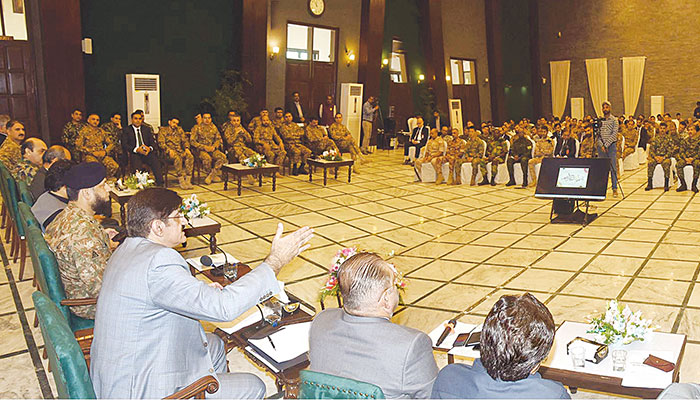Sindh fighting terrorism with coordinated operations, intelligence-sharing, says Murad
Sindh Chief Minister Murad Ali Shah on Tuesday said his government has implemented measures to combat extremism and terrorism, including intelligence-sharing and coordinated operations with law enforcement agencies. “Community engagement and outreach programmes have been initiated to prevent radicalisation, and promote peace and harmony.”
Shah made these remarks while addressing the participants of the National Security & War Course 25, which included 240 officers from the armed forces, civil servants, and military officers from 24 friendly countries, led by Chief Instructor Major General Mohammad Akhtar.
The CM highlighted various government initiatives aimed at strengthening the police force, including training programmes and infrastructure development. He specifically mentioned the upgrading of the Counter Terrorism Department and the Special Branch, as well as the launch of the Karachi Safe City Project.
Additionally, he highlighted the Sindh Smart Surveillance System project, which involves installing automatic number-plate recognition and facial recognition cameras at 40 toll plazas across the province.
He said that the investigation budget has been increased, with police stations allocated a direct budget of Rs4.8 billion. Furthermore, the police force has been provided with health insurance totalling Rs4.961 billion.
He also announced enhancements to the Shaheed package, increasing it from Rs10 million to Rs23 million, which now includes paying salary until retirement and job opportunities for family members.
To address the challenges in the Kutcha area, the provincial government is focusing on infrastructure development and social services. Resources have been allocated for the police to acquire modern technology, including drones, armoured personnel carriers and 12.7mm-calibre guns. Efforts are also underway to construct roads and bridges to improve mobility, which is essential for effective policing.
Regarding the province’s fiscal position, Shah said that the total budget outlay for 2024-25 is Rs3.056 trillion, which includes Rs1.912 trillion for current revenue, Rs959 billion for development projects and Rs184.8 billion for capital expenditure. General revenue receipts are projected at Rs2.562 trillion, with Rs1.9008 trillion from federal transfers and Rs661.9 billion from provincial resources.
However, the government is facing a Rs139 billion shortfall in Federal Board of Revenue transfers for the first two months of 2024-25, along with a Rs35.9 billion provincial revenue shortfall, resulting in expenditures of Rs300.9 billion and a deficit of Rs28.9 billion.
The CM emphasised the need for better financial management, noting that essential monthly spending amounts to Rs143 billion, which includes salaries and pensions. The government continues to prioritise infrastructure, social protection and public services, with foreign project assistance playing a key role in funding recovery efforts.
Shah also addressed the devastation caused by floods in 2022, which affected 70 per cent of the province, leaving 12 million people homeless and causing widespread damage.
“The Sindh government initiated emergency responses, and assessed the losses at $20 billion, presenting an $11.6 billion recovery plan at the Climate Resilient Pakistan Conference in Geneva.”
He said that for the 2024-25 fiscal year, Sindh has a development outlay of Rs959 billion, focusing on infrastructure, education, health and agriculture. “Public-private partnerships [PPPs] continue to drive progress, with Sindh’s PPP Unit ranked sixth in Asia.”
He also said the Sindh Peoples Housing for Flood Affectees programme is advancing housing reconstruction with WASH (water, sanitation & hygiene) and solar power facilities, benefiting 360,000 people. These efforts underscore Sindh’s resilience and commitment to recovery and long-term development, he added.
During a Q&A session, Shah announced that funds for local bodies have been increased from Rs82 billion in 2022-23 to Rs267 billion to strengthen them.
Their capacity is being developed through a special programme. He noted that Sindh is the only province to hold local body elections and transfer powers to the elected bodies.
In response to a question about the construction of the Kalabagh Dam, he expressed concerns that the lack of water in the system would deprive the province of water and lead to severe agricultural losses.
He also addressed the peaceful coexistence of Hindus in Sindh, saying that Hindus live harmoniously in the province, as evidenced by the election of two Hindus — an MNA and an MPA — in the general elections.
Meanwhile, during a meeting with a delegation of Chinese investors, led by Belt & Road Group Chairman Wan Xiaowu, Shah agreed to facilitate private Chinese investment in Karachi.
The CM said his government would welcome Chinese public and private firms to invest directly in the projects of their choice or strike a PPP with the provincial government.
Wan Xiaowu said that over 12 different top Chinese firms are interested in investing in Karachi, particularly in waste-to-energy projects, wastewater treatment, desalination water plants, manufacturing electric buses, kits to convert patrol-run motorbikes to electric energy, and reconstruction of the sewerage system. Shah said his government would provide all the necessary facilities to the Chinese firms to set up their plants.
-
 Timothée Chalamet Reveals One Thing That Influenced His Acting Career
Timothée Chalamet Reveals One Thing That Influenced His Acting Career -
 Prince Harry Secretly Reaches Out To King Charles, William Amid Andrew Scandal?
Prince Harry Secretly Reaches Out To King Charles, William Amid Andrew Scandal? -
 Bruce Campbell Makes Heartbreaking Statement As He Releases Details Of Cancer Diagnosis
Bruce Campbell Makes Heartbreaking Statement As He Releases Details Of Cancer Diagnosis -
 Kaley Cuoco Reveals How She Felt On The Set Of 'Charmed'
Kaley Cuoco Reveals How She Felt On The Set Of 'Charmed' -
 ‘Mouse Utopia’ Collapse Shows The Need For Space Colonies, Says Elon Musk
‘Mouse Utopia’ Collapse Shows The Need For Space Colonies, Says Elon Musk -
 Kate Middleton Sends Powerful Message To King Charles Amid Olive Branch To Meghan Markle, Harry
Kate Middleton Sends Powerful Message To King Charles Amid Olive Branch To Meghan Markle, Harry -
 Prince Harry, Meghan Markle Mark Major Milestone With Powerful Message
Prince Harry, Meghan Markle Mark Major Milestone With Powerful Message -
 'Emmerdale' Actor Eric Allan Breathes His Last After Incredible 48-year Career
'Emmerdale' Actor Eric Allan Breathes His Last After Incredible 48-year Career -
 Prince William 'already King Unofficially' Amid Charles Abdication Plans
Prince William 'already King Unofficially' Amid Charles Abdication Plans -
 FBI Hunts For Another High-profile Missing Case After Nancy Guthrie Disappearance
FBI Hunts For Another High-profile Missing Case After Nancy Guthrie Disappearance -
 Carrie Underwood Unleashes Fierce Response After Unfortunate Incident On 'American Idol'
Carrie Underwood Unleashes Fierce Response After Unfortunate Incident On 'American Idol' -
 Meta Tests AI Shopping Feature To Compete With ChatGPT And Gemini
Meta Tests AI Shopping Feature To Compete With ChatGPT And Gemini -
 Prince Harry’s Claims About Prince William Fight Get Exposed: ‘The Truth Is Different’
Prince Harry’s Claims About Prince William Fight Get Exposed: ‘The Truth Is Different’ -
 Savannah Guthrie Continues To Receive Support From Meghan Markle's Close Friend
Savannah Guthrie Continues To Receive Support From Meghan Markle's Close Friend -
 Alan Cumming's Unexpected Gesture Comes To Light As He Blasts BAFTA For Tourette’s Incident
Alan Cumming's Unexpected Gesture Comes To Light As He Blasts BAFTA For Tourette’s Incident -
 Global Oil, Gas Shipping Costs Soar As Iran Warns Of Strait Of Hormuz Closure
Global Oil, Gas Shipping Costs Soar As Iran Warns Of Strait Of Hormuz Closure




